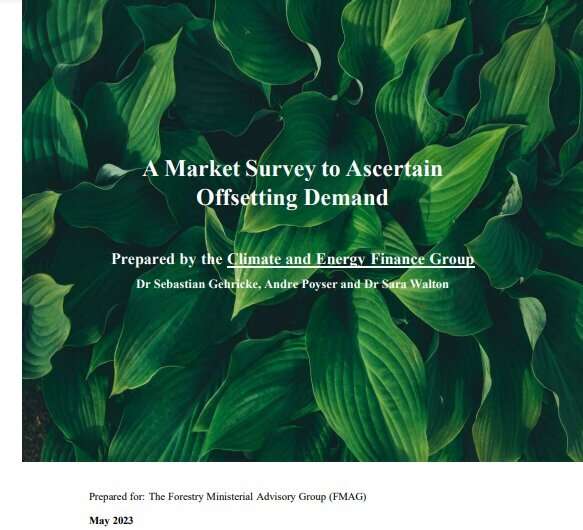This article has been reviewed according to Science X's editorial process and policies. Editors have highlighted the following attributes while ensuring the content's credibility:
fact-checked
trusted source
proofread
Demand for offsetting is low when carbon credit prices are high, finds New Zealand report

New Zealand organizations are motivated to reduce their emissions internally and expect the price of carbon credits to rise by 2030, a report by the University of Otago Business School's Climate and Energy Finance Group (CEFGroup) reveals.
The report, which was not peer-reviewed, was commissioned by the Forestry Ministerial Advisory Group to understand the demand for carbon offsetting, its drivers, and the extent to which this affects the forestry sector in New Zealand.
The CEFGroup, led by Dr. Sebastian Gehricke, conducted a survey between December 2022 and February 2023 aimed at decision-makers from a range of entities, including businesses, local councils, and iwi. Seventy organizations responded.
"These organizations were expecting prices to increase and are prioritizing abatement—that is investing in emissions reductions within their own value chain—in their emission reductions plans," Dr. Gehricke says.
"Since the survey was completed, the price of carbon credits has dropped significantly, due to policy uncertainty, so there is a real risk that these plans may change."
Most organizations believed companies should focus on emissions reductions and only consider offsetting for reductions beyond their net-zero targets.
They prioritized abatement (74% of future emissions reductions) over offsetting (12%) and insetting (14%) in their emissions reduction plans and most started to implement or identify specific abatement projects.
Only 31% of organizations bought carbon credits in the past year and most of those (79%) were willing to pay a premium for credits sourced from native or transition forests.
"Since many of the organizations have a strong desire for abatement, they need support so they can deepen and entrench their actions."
This included a combination of subsidies or payment for outcomes of abatement projects, and co-investment or guarantees to support project financial feasibility when these projects produce co-benefits.
Dr. Gehricke says the insights from organizations show they care most about the effect on biodiversity, credibility, and brand value, rather than the cost when choosing between emission reduction pathways.
"To me, this is a strong signal that consumer preferences and public perception are a huge driver of how these businesses make decisions.
"It also shows that if we continue to reward carbon removals through forests, we need to ensure the forests enhance biodiversity and do not create new risks and negative consequences."
More information: A market survey to ascertain offsetting demand. www.mpi.govt.nz/dmsdocument/57409/direct
Provided by University of Otago





















